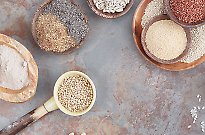
Magnesium boosts metabolism
Magnesium boosts metabolism

An easy way to remember which food is high in magnesium is to look at foods that are high in fibre, including legumes, whole grains, vegetables (especially broccoli, squash and green leafy vegetables), seeds and nuts (especially almonds). Other sources include dairy products, meats and chocolate. Water with a high mineral content, or ‘hard’ water, is also a source of magnesium.
Magnesium is also used as a laxative for constipation and for preparation of the bowel for surgical or diagnostic procedures and also as an antacid for acid indigestion.
It is recommended to take no more than 350 milligrams of magnesium per day. As an example, 30 grams of almonds contain around 80 milligrams of the recommended dietary intake of magnesium. So grab a handful of almonds to snack on every day!
What does magnesium help prevent?
It has been proven to be effective in the relief of attention deficit hyperactivity disorder (ADHD), anxiety, chronic fatigue syndrome (CFS), Lyme disease, fibromyalgia, leg cramps during pregnancy, diabetes, kidney stones, migraine, headaches, weak bones (osteoporosis), premenstrual syndrome (PMS), altitude sickness, urinary incontinence, restless leg syndrome, asthma and hay fever.
TOP TIP: Grab a handful of almonds to snack on for nearly 50 per cent of your recommended daily intake of magnesium.















